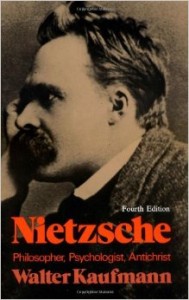 Nietzsche is and ought to be considered both icon and iconoclast in philosophy. “On the Genealogy of Morals” is considered to be his greatest ethical work. The work is made up of three essays, and this essay will involve an exposition and critique of the first essay. My plan is to continue this series by writing two more parts, covering the entirety of this masterwork of Nietzsche’s.
Nietzsche is and ought to be considered both icon and iconoclast in philosophy. “On the Genealogy of Morals” is considered to be his greatest ethical work. The work is made up of three essays, and this essay will involve an exposition and critique of the first essay. My plan is to continue this series by writing two more parts, covering the entirety of this masterwork of Nietzsche’s.
Exposition
The first essay is entitled “Good and Evil/Good and Bad.” In this essay, Nietzsche finds two separate historical meanings for the term “good”: one of which was prior and more natural, and the other arose as a reaction to the original term. The term “good” originates as a sort of feeling of pride that a certain type of person feels towards hirself. One might imagine an ancient warrior-ruler looking in the mirror and feeling pride in hirself and hir power. That feeling is, for Nietzsche, where the word “good” originated. It is a sort of naive, bro-ish view for modern tastes: anti-intellectual and self-centered, with an emphasis on healthiness, dominion, status, beauty, and excellence. It is naive in the sense that the original expression of “good” is unaware of the possibility of there being other forms or interpretations of the term. Being a philologist, the evidence that Nietzsche brings to bear is linguistic. Originally, the opposite of “good” was not “evil,” but it was rather the elite contrasting themselves with the “common,” the “bad.”
[W]hat was the real etymological significance of the designations for “good” coined in various languages? I found that they all led back to the same conceptual transformation–that everywhere “noble,” “aristocratic” in the social sense, is the basic concept from which “good” in the sense of “with aristocratic soul,” “noble,” “with a soul of high order,” “with a privileged soul” necessarily developed: a development which always runs parallel with that other in which “common,” “plebian,” “low,” are finally transformed into the concept “bad.” The most convincing example of the latter is the German word schlecht [bad] itself: which is identical with schlicht [plain, simple]–compare schlechtweg [plainly], schlechterdings [simply]–and originally designated the plain, the common man, as yet with no inculpatory implication and simply in contradistinction to the nobility. (i.4)
This is the core of Nietzsche’s argument in the first part. He draws attention to it in an uncharacteristically straightforward manner, saying:
Nietzsche, small mustache
With regard to moral genealogy, this seems to me to be a fundamental insight . . . (i.4)
With regard to Nietzsche in general, and this work in particular, the issue of Nietzsche’s “racism” and “anti-Semitism” has to be addressed early on. It ought to be common knowledge by now that an accurate reading of Nietzsche shows that he was neither racist nor anti-Semitic. Kaufmann gives a thorough treatment of the issue in Nietzsche: Philosopher, Psychologist, Antichrist. The soiling of Nietzsche’s reputation was precipitated by his sister, who laid claim to his work after his death and ruthlessly attempted to appropriate it for Nazi use in full knowledge of Nietzsche’s true opinions. Her case of academic deceit cannot be attributed to ignorance. In correspondence with her as well as in his published writings, Nietzsche never misses an opportunity to slander the anti-Semitism which was growing in Germany at the time. Reading Kaufmann’s vindication of Nietzsche is truly a delight, because Nietzsche not only makes his opinions known, but he does so in his characteristically clever manner.
 Yet, in reading this first essay in particular, one can see how easily the Nazis could appropriate Nietzsche’s work for their use. By altering or ignoring details, one could construe Nietzsche as racist, especially because, in the course of his “genealogy,” he must allude to different races and conflicts between races. One race can be construed to be “superior” based on the fact that it came to dominate another race, as the Romans historically came to dominate the Jews. The Nazi lie about Nietzsche was a subtle one, like accusing someone interested in anthropology of being a racist. Kaufmann has shown that Nietzsche’s “blond beast” is just a creative way of saying “lion.” Yet, Nietzsche, aware of these opinions and the desires of others to misconstrue, takes pains to separate himself from a racist interpretation. To cite but one example:
Yet, in reading this first essay in particular, one can see how easily the Nazis could appropriate Nietzsche’s work for their use. By altering or ignoring details, one could construe Nietzsche as racist, especially because, in the course of his “genealogy,” he must allude to different races and conflicts between races. One race can be construed to be “superior” based on the fact that it came to dominate another race, as the Romans historically came to dominate the Jews. The Nazi lie about Nietzsche was a subtle one, like accusing someone interested in anthropology of being a racist. Kaufmann has shown that Nietzsche’s “blond beast” is just a creative way of saying “lion.” Yet, Nietzsche, aware of these opinions and the desires of others to misconstrue, takes pains to separate himself from a racist interpretation. To cite but one example:
[B]etween the old Germanic tribes and us Germans there exists hardly a conceptual relationship, let alone one of blood. (i.11)
Let us now leave the question of racism and return to the gist of Nietzsche’s argument. We have on the one hand the original meaning of “good,” an interpretation which I have described as bro-ish, that originated in the ruling class, and these rulers contrasted themselves with the “common” and “bad.” The original rulers were, in fact, rather simple. For them, “evil” literally did not exist. In their world, the commoners were to be pitied, and their enemies were respected with the respect that fighters give to other fighters.
The second meaning of the term “good” arises as a reaction when those ruled by the bros have to look themselves in the mirror. This interpretation of the term might be called the “evil twin” of the original, because it arises from a suppressed emotion, which Nietzsche calls by the French term ressentiment. When the ruler looks hirself in the mirror, hir notion of “good” is one of pride and is aligned with health, power, and physical beauty. Yet, those who are ruled, the subdued class, powerless to counteract the rulers, appropriate and invert the term, and now to be truly “good” is described as to be humble, meek, impoverished, ugly. What was formerly “good” has now become “evil:” the exertion of power and the subjugation of the weak. Christian religion in particular, coming from the Judaic tradition, is the preeminent example of this inversion, and the religious doctrines of Christianity act as a fantastic justification of this view through recourse to an other-worldly metaphysic. Yet, it is not the only example of such an inversion. Nietzsche also includes in this group the “indifference” or “detachment” (Kaufmann does not use the term in his translation) of the Chinese religion. The latter interpretation of “good” is conveyed as the product of an “inactive,” “festering” psychology, plagued by ressentiment.
The primary conflation of the debunked Nazist interpretation is to view Nietzsche’s work as prescriptive rather than descriptive. Nietzsche invents a form of linguistically-based historical psychology to explain the origin of moral tastes and preferences, showing how the tastes of one group influenced and overcame those of another. He attempts to explain what happened, for better or worse, not what “ought” to happen in the future. In fact, as Nietzsche sees it, intellectualism itself originates in the subdued class, and we ought to never forget that, in the end, the slave morality was victorious and became what is perceived as “fact.”
A race of such men of ressentiment is bound to become eventually cleverer than any noble race; it will also honor cleverness to a far greater degree: namely, as a condition of existence of the first importance . . . .(i.10)
While the slave class is the originator of intellectualism, members of the ruling class are conveyed as beasts of prey, and something intrinsic to them wants to get back to nature.
One cannot fail to see at the bottom of all these noble races the beast of prey . . . this hidden core needs to erupt from time to time, the animal has to get out again and go back to the wilderness . . . (i.11).
Nietzsche ends this first section with a lengthy Latin quote from Tertullian’s “De Spectaculis,” an essay about the notoriously gruesome “public games” of the Romans. Tertullian’s piece might be called the written expression of ressentiment incarnate. The lengthy passage of the early Christian father might be paraphrased as follows: If Roman games in the arena are considered enjoyable, imagine how enjoyable it will be when Christ returns and all of his enemies throughout the world are consumed by flames of wrathful fire, and the Christians get to watch for their own enjoyment.
 Critique
Critique
A genuine critique of Nietzsche’s work would involve a critique of his methodology and would require an entire work of its own. My “critique” here instead accepts Nietzsche’s argument more or less wholesale and looks for inconsistency in details. That said, I would like to focus on Nietzsche’s interpretation of Judaism.
Nietzsche paints the Jews with too broad a brush. Judaic writings of the Old Testament have more in common with the “warrior class” ethos than that of “slave morality.” Consider Ecclesiastes, King Solomon, the Psalms, which are said to be from his pen, the (fictional) story of the wandering Hebrews, led by Joshua, overtaking the fortified “promised land.” In other words, Judaism needs to be contrasted with the Christianity that is a later development.
The following passage is, and ought to be, extremely perplexing.
About the time of the Thirty Years War, late enough therefore, this meaning changed to the one now customary. (i.4)
That Nietzsche places the slave revolt in morality so late shows who he considers his audience to be. It is at once charming and alarming to the modern reader to realize that Nietzsche is talking, not about world history here, but about German history. Yet, everything he says about a slave revolt in morality ought not to be about Germans versus Jews, but about Romans versus Jews. The whole construct fits together perfectly: As the Romans overtook the Jewish “promised land”, the powerlessness of the Jews gave rise to ressentiment. The resulting psychological unrest among the Jews resulted in factionalism, which eventually gave rise to Christianity.
Considering that Nietzsche’s focus is on German history, a more involved critique would require answering the question: Does Nietzsche’s genealogy apply accurately to German history? My suspicion is that it does not. To establish this, however, would require more time and space than we have available here.
